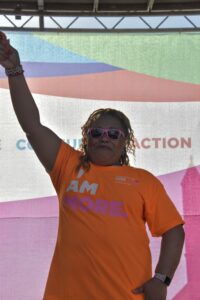
This is Soyrorian McLendon’s story in her own words.
My aunt was 59 years of age when she was diagnosed with metastatic breast cancer on December 31, 2018. She passed away in June of 2019. She did not have the opportunity to fight cancer because she waited to go to the doctor because of two stigmas in Black communities.
First, Black families do not discuss their family medical history, and many are not insured with medical insurance. My aunt was afraid to ask her doctor for help. She stated, “I did not have adequate medical insurance, and I would not have received the help I needed.” Those words have haunted me every day since her passing. Why does a person have to die because of their limited resources?
Secondly, there is not enough breast care awareness in Black communities for the insured and uninsured. My aunt was unaware there were resources for her until I contacted the Susan G. Komen Breast Care Helpline at 1-877 GO KOMEN. They provided my aunt with great resources such as links for breast health information on komen.org. They also provided guidance on financial aid (pre-determined based on her eligibility) for my aunt, who was actively undergoing breast cancer treatment. This was a big help to my aunt, because of this, she was able to get to her medical appointments. My aunt was very appreciative of the Helpline representative’s support and listening ear when she needed someone to answer her questions and listen to her concerns. The resources made her feel comfortable making crucial decisions at the very end of her life.
In March 2021, my life changed. When the doctor’s offices reopened more than a year after dealing with strict Covid-19 restrictions, I knew I had to get my mammogram. I scheduled my appointment and went in to have it done. Nothing prepared me for what I was about to hear – my mammogram came back abnormal. I needed more tests. There was not an emotion I did not feel. I never had an abnormal mammogram before. After other imaging tests, the doctor wanted me to have an ultrasound-guided biopsy. I waited nervously for the pathology report to come back to say it was not cancerous. I was diagnosed with intraductal papillomas of the right breast with atypical ductal hyperplasia (ADH). I had to have surgery to remove the mass and wait on the final pathology report to see if any cancer cells were found. The test result came back, and it was benign, thankfully. But due to the ADH, I had to be started on a plan to reduce my risk of developing breast cancer. After talking with my oncologist, I felt I needed more information on everything I was facing. So I wanted to get a second opinion from another oncologist. I immediately reached out to the Susan G. Komen Helpline. The representative was very compassionate, heard my concerns, and provided me with tons of information on the breast condition I had and the standard care plan mentioned by the oncologist. The information was a great help to me. I was able to make a firm decision to move forward. After meeting with the second oncologist, we discussed my care and I will soon be starting a medication plan very soon to reduce my risk.
To conclude, now that I am part of the Komen family, I am committed to bringing breast care and breast cancer awareness to Black women. I encourage Black women to get to know their breasts and to have hard conversations with their family members about their family medical history. That way other family members will benefit from the information shared and make a plan with their doctor to take care of their health.
MAMMOGRAMS SAVE LIVES, SO GET YOUR YEARLY MAMMOGRAM! If you are a cancer survivor, become an advocate and make your local lawmakers, congressman and congresswoman aware of your story. Too often, people diagnosed with breast cancer cannot afford their treatment. They may be uninsured or underinsured and must choose if they’re going to live or die. They may not be able to afford preventative care, either. It is so important for our government to know the financial burden to breast care and breast cancer treatment so the government can help make it affordable. This has to change now! Organizations like Komen fill in the gaps to help people with these expenses. If you are uninsured or underinsured, call the Susan G. Komen Helpline at 1-877-GO-KOMEN to get the resources and information you need. It may save your life.
Statements and opinions expressed are that of the individual and do not express the views or opinions of Susan G. Komen. This information is being provided for educational purposes only and is not to be construed as medical advice. Persons with breast cancer should consult their healthcare provider with specific questions or concerns about their treatment.



